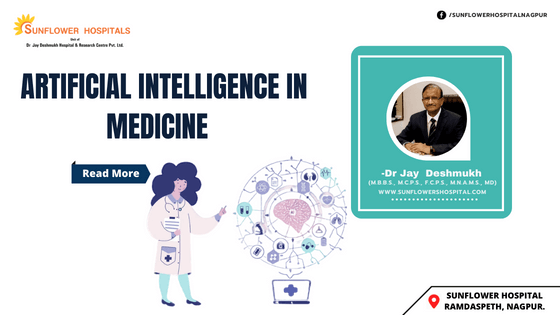What are the Artificial Intelligence solutions that are being used today?
Sid is the most popular personal assistant offered by Apple on iPhone and iPad. Not only smartphones but automobiles like Tesla are also shifting towards artificial intelligence. Cogito, Netflix, Pandora, (Google ), Box-ever, Flying Drones, and Echo launched by Amazon are artificial intelligence applications that are gaining popularity at a quicker pace. They help us and influence the way we live, interact, and improve customer experience.
What is the impact of Artificial Intelligence on Cardiovascular dis-ease?
Scientists and doctors at Mayo Clinic, USA are combining AI with clinical practice for better care. In emergency rooms, patients get a CT scan of the brain to rule out intra cerebral or brain hemorrhage. The scan is examined by a computer trained to analyze CT data, cutting the time to diagnosis and limiting brain damage. Can Artificial Intelligence prevent heart problems? Applying AI to ECGs has resulted in a low-cost test that is widely used to detect the presence of a weak heart pump, which can lead to heart failure if not treated. At Mayo Clinic Rochester they have collected a database of more than 7 million ECGs. These databases are analyzed to accurately predict heart failure non-invasively inexpensively and within seconds.
Can artificial intelligence detect heart rhythm disturbances like atrial fibrillation sooner?
AI-guided ECGs can predict faulty heart rhythms sooner than they are evident clinically and before symptoms develop. health trackers can mon-ito• heart rate, activity levels, and sleep levels, and some even have launched ECG tracings as a new future. All these new advances can alert the user regarding any variation and let the doctor have a better idea of the patient’s condition. People in the Netherlands used Al for their healthcare system analysis, detecting mistakes and treatment, and workflow inefficiencies to avoid unnecessary hospitalizations.
What is the role of AI in gastroenterology?
AI can play a role in various facets of gastroenterology. Endoscopic examinations such as Artificial intelligence ( Al ) is the branch of computer science that develops machines to think and work like human beings. Voice recognition is the most widely used Al technology in business today. Many feel that Al is the future. However, the fact is that it is the present. John McCarthy first described the term Al in 1956 as the science and engineering of making intelligent machines.
What are the Research innovations in cardio-vascular artificial intelligence?
The new AI tools and technologies can predict the risk of embolic stroke or para• lysis, monitor the heart, and detect irregular heart rhythms, there is very fruitful ongoing research in developing AI technology compatible with smartphones and high-tech stethoscopes.
What about AI in daily use?
Fitbit, Apple, and other esophagogastroduodenoscopies (EGD )and colonoscopies rely on the rapid detection of abnormal tissue. By enhancing these endoscopic procedures with AI, clinicians can more rapidly identify diseases, determine their severity and visualize blind spots. Early trials in using AI detection systems for early gastric cancer have shown sensitivity close to expert endoscopists.
Can we prevent accidents by using AI while driving?
Large technology companies such as Apple, Google, Amazon, and Baidu all have their own Al research divisions. Many automobile manufacturers are beginning to use machine learning health care in their cars as well. Companies such as BMW, GE, Tesla, Toyota, and Volvo all have new research campaigns to find ways of learning a driver’s vital statistics to ensure they are awake, paying attention to the road, and not under the influence of alcohol or in emotional distress.
What is the role of AI in radiology?
Al is being studied within the field of radiology and could detect and diagnose diseases through computerized tomography and magnetic resonance imaging. It may be more useful in resource-limited settings and also where data is too complex to be efficiently interpreted by human readers. Al can provide benefits to radiologists in many ways. It can create high-quality images from lower doses of radiation enhance MR image quality and automatically assess image quality. AI also has a major role in nuclear medicine.
As per Mayo Clinic in Rochester US the basic building block of an AI system is a neural network. A computer system is trained by analyzing hundreds and millions of similar readings. It there. fore becomes experienced in looking at a focused problem such as ECGs. The result is that an A I system can read a simple test, detect a heart condition and predict possible future problems. Artificial intelligence is supposed to be better than any other test to diagnose early breast cancer. An I has enormous potential for the present and future.
Author: Dr Jay Deshmukh
Dr Jay Deshmukh is Chief Physician and Director, Sunflower Hospital, Nagpur Honorary Physician to Honorable Governor of Maharashtra and PondicherryCentral. Dr Jay Deshmukh is an M.B.B.S., M.C.P.S., F.C.P.S., M.N.A.M.S., MD From Internal Medicine – Bombay and New Delhi.


